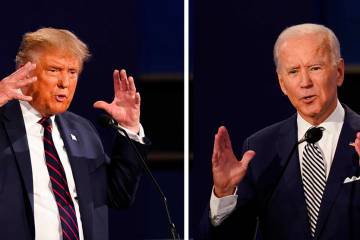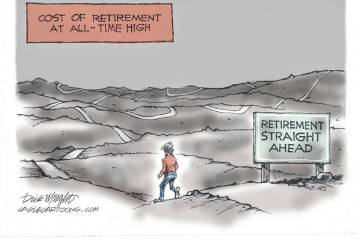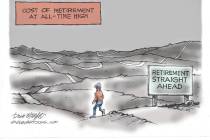COMMENTARY: Time to abandon the one-size-fits all teacher pay scale
Kudos to the Clark County School District for bumping the salary for new teachers to more than $50,000. The previous amount of $43,000 was unlikely to attract the best and brightest to such a demanding and important job.
But now that the district has taken this step to help attract great teachers, elected officials need to do more to help the district retain them. That, however, will require addressing the single biggest roadblock preventing the district from paying exceptional teachers what they are worth: the teachers union.
Unions have for years opposed efforts to reward exceptional teachers with exceptional pay. Unions instead demand a one-size-fits-all approach in which compensation is based primarily on longevity. There is no dispute that this leads to situations where great teachers are underpaid.
The unions are playing a numbers game. Given their primary goal is to maximize their dues-paying membership, unions correctly understand that catering to the largest number of members is best for business, even if that means driving out the comparatively smaller number of exceptional teachers. This also explains why unions oppose efforts designed to measure student learning and thereby identify and reward exceptional teachers for their hard work. It would, after all, be much harder to defend such a blatantly anti-student policy if the district had that kind of teacher effectiveness data ready at hand.
Rewarding effective teachers appropriately isn’t just good for them, however. Teacher merit pay is also associated with a positive and statistically significant increase in student test scores, according to a comprehensive meta-analysis of the 26 studies conducted on the topic.
For these reforms to happen, however, Nevadans will first need to elect state legislators who are willing to revoke the monopoly powers enjoyed by Nevada’s teachers unions. These laws force school districts into negotiations under rules that heavily favor the union, while also forcing nonunion members to be bound by the union agreement, whether they like it or not. Such coercive powers and the ability to deny workers their fundamental free speech rights would be unjust under any circumstance, but that this applies to public-sector unions makes things even worse.
Public-sector unions are fundamentally different from private-sector unions.
In the private sector, labor negotiations are constrained by the degree to which the workers and employers can work together to produce a net benefit to society. If workers demand wages that exceed the value of the ultimate product sold to consumers, consumers won’t buy at the high price demanded and both the workers and employer lose their respective jobs. Conversely, if the private-sector employer offers wages that are beneath the value provided by workers, the workers will go elsewhere, leaving the employer with nothing but an empty building and its accompanying utility bills.
The public sector, however, is completely different. Here, taxpayers are forced to pay the costs that government imposes upon them. Thus, costs can and do rise to a level that results in a net harm on society, because taxpayers, unlike ordinary consumers, are captive and must pay for the higher costs whether they like it or not. This is why, historically, even the most pro-labor politicians, as well as union leaders themselves, routinely declared that unionization has no place in the public sector.
As private union membership plummeted, however, union bosses were in search of a new source of revenue, and that’s exactly what they found when they expanded into government.
While we’ve all been made worse off as a result, it is in the field of public education where unionization has caused the most damage. Ever since Nevada mistakenly granted monopoly powers to teachers unions, education has steadily gotten worse while the cost to taxpayers has gone up.
Voters need to elect state legislators who will pledge to ensure that Nevadans’ education tax dollars are spent on measures that will actually improve education, regardless of what that means for the financial health of unions. If that ever happens, it will be good news for students and teachers alike.
Robert Fellner is Nevada Policy’s vice president and director of policy.























